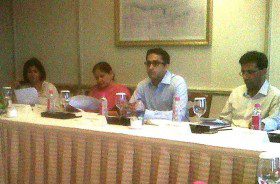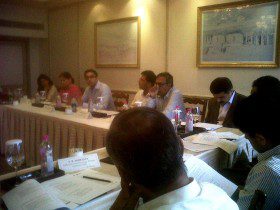
Mangla, second from right
Discussion on “Effective Implementation of Primary Education Policies in India.”
As part of the “Best of Harvard in India Series,” the Harvard South Asia Institute (SAI) and Harvard Business School (HBS) partnered with the Central Square Foundation (CSF) to host a Round Table Discussion on “Effective Implementation of Primary Education Policies in India” on August 1, 2014. CSF is a non-government organization focused on improving the educational outcomes for low-income children in India. The discussion, held in Delhi at the Taj Mahal Hotel, was moderated by Professor Akshay Mangla, Assistant Professor, Business, Government and International Economy Unit, Harvard Business School, and Member of SAI’s Steering Committee.
The discussion was based on Professor Mangla’s extensive field research that focused on the Indian states of Bihar, Uttar Pradesh (UP), Uttarakhand (UK) and Himachal Pradesh (HP). The event was well attended by other experts in the field, both governmental and non-governmental, including Mr. S.R. Mohanty, Additional Chief Secretary, Primary education, Madhya Pradesh, Shabnam Sinha, Senior Education Specialist, World Bank, Colin Bangay, Senior Education Advisor, DFID, Madhav Chavan, Co-founder Pratham and others.

The event was well attended by other experts in the field, both governmental and non-governmental.
Professor Mangla shared with the group his on-ground findings on the present day system, based on the Central Government’s education policy which includes the Sarva Siksha Abhiyan, as well as the midday Meal Program and the Right to Education. In the course of his surveys, Prof Mangla has conducted over 500 interviews at the State and district level, as well as at the village and school level. He compared his findings in the Northern states of HP, UK and UP.
There were dramatic variations in school attendance and literacy rates even in these contiguous states, with HP forging ahead of the others because of some innovative social policies. Professor Mangla’s study showed that a progressive and flexible mindset with greater autonomy produced a more effective education system, whereas a rigid bureaucracy proved less effective.
The discussion, with a goal to try to resuscitate the Indian education system – the largest public education system in the world – and make it relevant to Modern India, was focused on three main areas: 1) How to promote deliberation and learning within the state; 2) How to recognize, adapt and upscale best practices: and 3) How to strengthen the public educational institutions.
Several key problems were identified by the group of experts, ranging from lack of leadership in public schools, teacher absenteeism, lack of an accountability and monitoring system to an absence of innovation and incentives. What was clear was that more detailed discussions with recommendations for solutions were needed for the main problems identified. This round table discussion is the first of the series of such research-based workshops organized around this subject.
